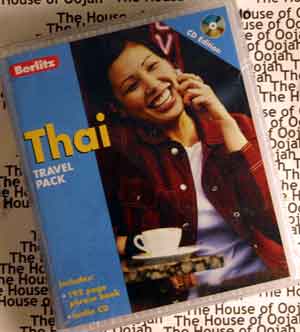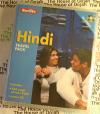Berlitz Thai Travel Pack -Audio CD and Phrase Book - Learn to speak Thai
|
Brand New Audiobook Berlitz Thai Travel Pack - Phrase Book and Audio CD |
 |
Berlitz Thai Travel Pack - Phrase Book and Audio CDBrand New 1 Audio CD 192 page Phrase Book This travel pack offers a fast and effective way for travellers to learn basic words and phrases. Based on the Berlitz listen-and-repeat approach, the CD features more than 300 essential expressions while the book contains more than 1200 words and phrases. * 1,200 words and phrases CD Track 1 - Introduction, Basics Track 2 - Arrival Hotel Track 3 - Eating Out Track 4 - Getting Around Track 5 - Sightseeing Track 6 - Entertainment, Making Friends Track 7 - Shopping Track 8 - Numbers, Emergencies
About the Thai LanguageThai is the national and official language of Thailand and the mother tongue of the Thai people, Thailand's dominant ethnic group. Thai is a member of the Tai group of the Tai-Kadai language family. The Tai-Kadai languages are thought to have originated in what is now southern China, and some linguists have proposed links to the Austroasiatic, Austronesian, or Sino-Tibetan language families. It is a tonal and analytic language. The combination of tonality, a complex orthography, relational markers and a distinctive phonology can make Thai difficult to learn for those who do not already speak a related language. Standard Thai, also known as Central Thai or Siamese, is the official language of Thailand, spoken by about 65 million people including speakers of Bangkok Thai . Khorat Thai is spoken by about 400,000 (1984) in Nakhon Ratchasima; it occupies a linguistic position somewhere between Central Thai and Isan on a dialect continuum, and may be considered a variant or dialect of either. In addition to Standard Thai, Thailand is home to other related Tai languages, including: * Isan (Northeastern Thai), the language of the Isan region of Thailand, considered by some to be a dialect of the Lao language, which it very closely resembles (although it is written in the Thai alphabet). It is spoken by about 15 million people (1983). Many of these languages are spoken by larger numbers outside of Thailand. Most speakers of dialects and minority languages speak Central Thai as well, since it is the language used in schools and universities all across the kingdom. Numerous languages not related to Thai are spoken within Thailand by ethnic minority hill tribespeople. These languages include Hmong-Mien (Yao), Karen, Lisu, and others. Standard Thai is composed of several distinct registers, forms for different social contexts: * Street Thai : informal, without polite terms of address, as used between close relatives and friends. Many Thais can speak at only the first and second levels, though they will understand the others.
|
Berlitz Thai Travel Pack - Phrase Book and Audio CD |
| Stock Info: | Out Of Stock |
| Receive In Stock Notification |

 0 Items (Empty)
0 Items (Empty)
